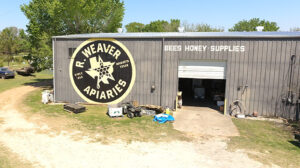
Navasota – There’s nothing like spring around the Brazos Valley. The wildflowers are always fantastic when things start to warm up around the Lone Star State and that makes this area the perfect place for a little pollination. Maybe that’s why there’s such a buzz at the BeeWeaver Honey Farm near Navasota, a bee business that’s been around for over 130 years.
Daniel Weaver is the 4th generation of beekeepers in his family and it’s a business that’s been on the same plot of land since the 1800’s. “My great-grandparents moved here after the Civil War, and met and married in 1888. They were given 10 hives of honeybees as a wedding gift by Florence Weaver’s brother, Frank Summerford, who had been keeping bees in this part of the world for about 10 years prior to that. And that’s how my family got started in the bee business,” explained Daniel. “They turned that wedding gift into an enterprise that was subsequently operated by my grandfather, Roy Weaver, Sr., his sons, Binford, my father, and Roy Weaver, Jr., and then subsequently me,” said Daniel.
Daniel’s right-hand man is Roosevelt Robinson and he’s been with the company longer than Daniel’s known about the birds and bees. “I’ve been working here since 1966, when I started here. Seemed like the longer I work, the more I learned and the more I came to love it,” said beekeeper Roosevelt Robinson.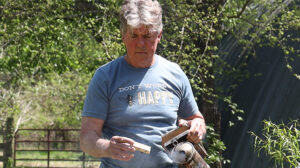
“One of my earliest memories of beekeeping is from right about the time Roosevelt started working for Weaver Apiaries,” stated Daniel.
“They called me King Bee,” joked Roosevelt. Roosevelt gives tours daily and showcases the benefits of bees. “If you got bees, your crop’s going to do better, your fruits going to do better, your garden’s going to do better. Good pollination,” explained Roosevelt.
Being one with the bees must have some stinging perks! So we had to know just how Roosevelt handles that! “I get that question asked every, every day. You know, the best way I can give that answer, if I had a dollar, the time I been stung, I’d be a rich man. That’s about the best way I can answer that,” joked Roosevelt. “It’s fairly rare for someone to get stung, although anytime you’re around honeybee colonies, that’s a risk you assume,” said Daniel.
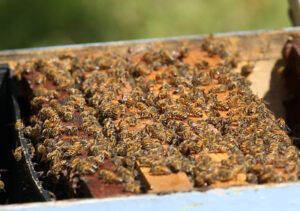
Seeing the busy bees doing their best work is fascinating but making honey isn’t the bread of butter of BeeWeaver Farms, it’s actually the breeding. “Our bees are just a little tougher than the rest, if you will,” stated Daniel.
In the late 80’s Varroa mites were found in the United States and these small parasites wreaked havoc on the honeybee population, the varroa mite. “It’s [varroa mite] very much like a tick, if you will, and it reproduces in the brood or the developing baby bees, and then can also be present on adult bees as well. So, it can be quite devastating if the bees that you have are not capable of coping with them,” explained Daniel.
When the parasites found their way to Texas, BeeWeaver Farms wasn’t spared. “Well, we killed thousands of hives, but that didn’t stop Varroa mites from spreading everywhere like wildfire. And it quickly became apparent that the conventional means of managing Varroa mites required constant application of toxic chemicals in the colony and that was an anathema to me. I could not get my head around having to constantly put poisons… They are acaricides, that is they kill mites, but they’re also insecticides and they kill bees at just slightly higher concentrations inside of colonies. I didn’t think that was the right way to go,” explained Daniel.
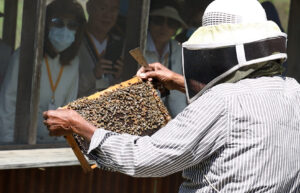
So Daniel and his father concentrated on breeding a better bee through natural selection. “Over the course of the ensuing seven or eight years, we were able to develop a population of bees that can survive and thrive in the presence of Varroa mite infestation without any application of toxic chemicals. They do it through their behavior and physiology and immunology, which is all a little bit different in our bees than in standard managed stock,” said Daniel. “By 1999, none of our colonies were treated and haven’t been treated since. So, for more than 20 years now, we’ve been completely chemical free and reliant entirely on the attributes of our particular population of honeybees,” said Daniel. “I’m proud of that because I think it gives beekeepers freedom from the constant worry that Varroa mites are going to kill their colonies. It liberates them from the need to put toxic compounds inside their colonies in order to eliminate Varroa mites and reduces the cost of beekeeping too,” expressed Daniel.
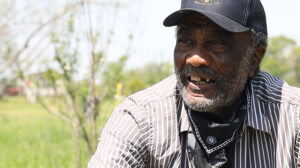
With the bees thriving at BeeWeaver, the honey here might actually be a little bit sweeter. “We don’t use chemicals at all in any of our hives, so the honey that comes out of our hives is 100% chemical free,” said Mitzy Camp. Camp runs the BeeWeaver store. “If it’s got to do with bees, we have it,” stated Mitzy.
Mityz gave me a taste of the different types of honey on hand. And of course, they have a spicy honey that we had to try. The Carolina Reaper infused honey definitely gives that kick but blends well with the fresh honey. If you’re looking for something to chew on, honeycomb is an option here. The honeycomb here can go straight from the hive to your mouth! “My mom used to use this as bubble gum growing up. She’s 94 and this is what they used as gum when she was growing up,” said Mitzy.
While you’ll have to bring your own milk, there is plenty of honey to go around at the BeeWeaver Farms and getting an inside look at this family business for the ages is the bee’s knees on The Texas Bucket List. “I was fortunate enough to learn from the best,” expressed Daniel. “It’s just amazing what you can take a beehive and make it do for you,” said Daniel. “I love the people. I love the honey. I love the story,” said Mitzy.